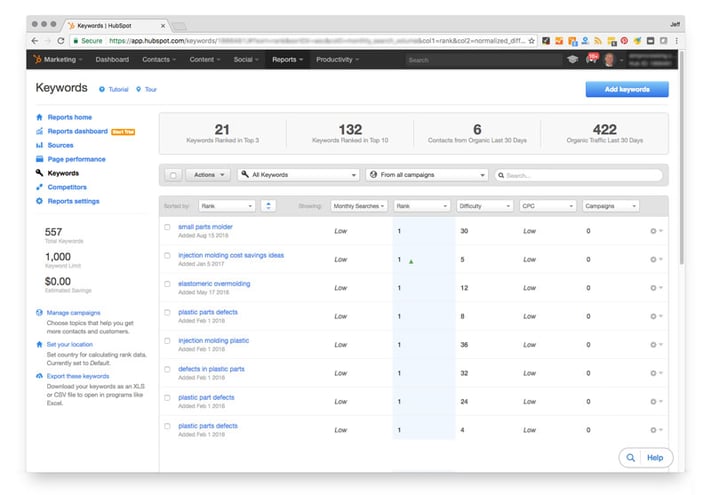Killer Keyword Concepts At The Core of Inbound Marketing

One of the core elements of inbound marketing is the thoughtful, constructive, and strategic use of keywords. Keywords are first and foremost the words or phrases that users enter into search engines when they are attempting to find information or a company's website they are interested in. Understanding keywords and how they are used is critically important to any inbound marketing effort. Because these words and expressions are a reflection of interest on the part of the searcher, they are also critical to search engines' logic, and must therefore be a critical element of the inbound marketer's strategy.
The following concepts are the most basic principals that should be understood, and applied to any inbound marketing effort. NOT doing these things will sabotage any effort to dominate your niche with content marketing.
Keyword Research and Common Mistakes
Contrary to popular belief, keyword research isn't really about optimizing for search engines, rather, it's about optimizing your website and social media for the content searchers are looking for. Whenever you create content, you should make every effort to use the words your customers and prospects are using. Listening (in all forms) is a basic tenet of business. Online listening is often represented by what people are looking for through search tools, i.e. search engines and on-site search. Exploring buyer personas should not only reveal important information about the nature of your prospective customers, it should also help reveal the questions to which your customers are seeking answers. The better you can understand your target personas, the more likely you will be able to understand and speak in the language of your customer.
Keyword tools, such as Moz's free Keyword Explorer, Google's Keyword Planner, and Wordstream's keyword suggestion tool can be very helpful in determining what searchers are looking for, but don't make the mistake of trying to manage and track your progress on too many keywords. While it can be helpful to let these kinds of tools recommend keywords based upon the content of your website, they will recommend a ton of words that you really wouldn't expect your prospects to search for. So do your best to determine what your primary keywords are, and knock those out of the park with rich meaningful content that answers your personas' questions about those topics.
HubSpot Tips
HubSpot has a handy keyword recommending tool as part of the Keywords reporting tool.
Search Engine Ranking for Your Keywords
The reality is, when you don't show up in a search engine, it basically means that you don't appear to have anything relevant to the needs of the searcher. So as painful as it is to hear, when your content doesn't show up in search engines, it's just not great content, i.e. you're not delivering user value. How CAN it be great, if the content can't be found? There is no doubt that one of the primary goals of inbound marketing is search engine optimization (SEO). But the good old days of black-hat techniques are gone, and there are no shortcuts to page one of Google... no matter what these SEO companies would try to tell you.
HubSpot Tips
Tools like HubSpot's Keywords report can give you a status update on how you're doing at climbing the rankings with the keywords you are focusing on. 
And let there be no mistake about it, you MUST focus on the keywords you care most about. You won't rise in the search engines just because you're the best or the biggest. Search engines are highly motivated to rank the links presented on search engine results pages (SERPs) in a way that is fair and logical. They use a number of criteria, but none are more important than the content on your website.
Content Marketing with Keywords
Knowing what people are searching for is a powerful driver for content marketing. In fact, knowing what people are searching for within your niche should inform and influence the content that you create. Google Trends can be a very helpful tool for determing what keywords are trending and where the opportunities within your niche might lie. And it is important to establish and focus on your content niche. You shouldn't worry about producing good content for everyone, rather, focus on producing great content for your specific audience, within your niche.
If you "target" 20 personas in one blog or content piece, it's almost certain to be an ineffectual piece. At best it will fail to resonate with most of the audience, and at worst, cause confusion. Once of the most common mistakes made in producing content within a content marketing strategy is to fail to understand how your target personas speak. Examine your content. Is that how they speak? Are you using the words that THEY would use, or are you using internal speak, or cleverly-named terms that some marketer told you would help you with branding, and in the process, you're now creating content that will never be found? Content marketing is all about producing content that responds to the specific needs of your target audience, with great (and unique) answers.
HubSpot Tips
By monitoring your progress for the keywords you care most about through tools like HubSpot's Keywords report, you can ensure that you are developing content that reflects the meaning of the keywords searchers are using. This isn't just keyword density (although that can be a part of it), but about understanding what searchers are looking for, and then giving it to them. Within HubSpot's CMS, you are given the opportunity to optimize your content using the Optimize feature. You enter or select one or more of the keywords for which you wish to optimize the page, and the tool will prescribe changes that will make your page content better, i.e. better optimized for those keywords.
Metadata
Much has been said about metadata, and I'm certainly not going to bore you with a lot of gobbledygook here. The fact is that metadata, i.e. the behind-the-scenes information that is intended to describe the content of a page or blog, while less important than in years past, still has some relevance to search engines (some more than others.) At a minimum, some metadata is used in the presentation of search engine results, and other includes things like page title, both of which can matter to readers. You should give thoughtful consideration to the metadata of a blog post or website page, and at a minimum, apply best practices.
HubSpot Tips
HubSpot allows you to enter this information through the Settings tab while in the CMS editor. HubSpot also gives tips for maintain those best practices, providing warnings when you violate them.
Keywords Shouldn't be a Content Marketer's Afterthought
If you give them what they crave, they will love you for it. As an agency aspiring to be one of the top content marketing agencies in the country, we are growing in Springfield, MO, Olympia, WA, and Colorado Springs, CO. If you need help with HubSpot, or are looking for an inbound marketing agency anywhere in the U.S., please give us a shout. We can help you better understand the importance of keywords.


